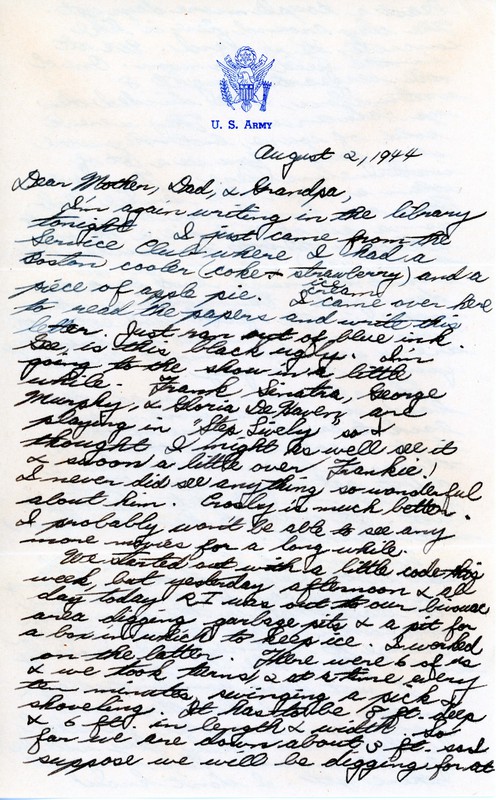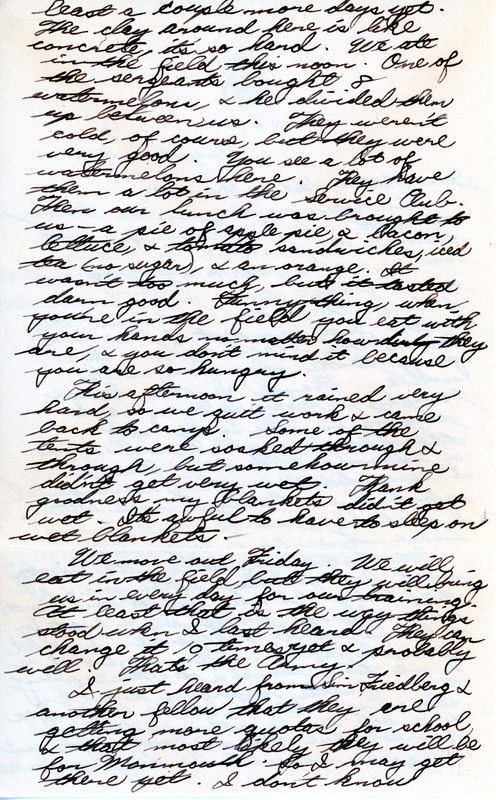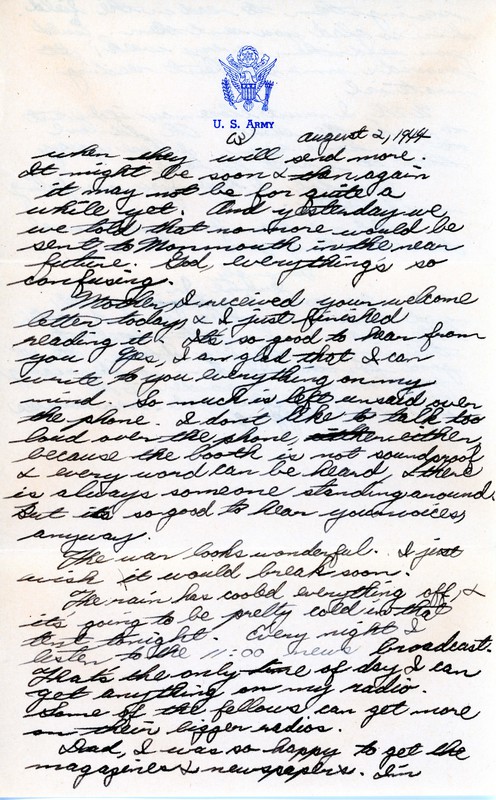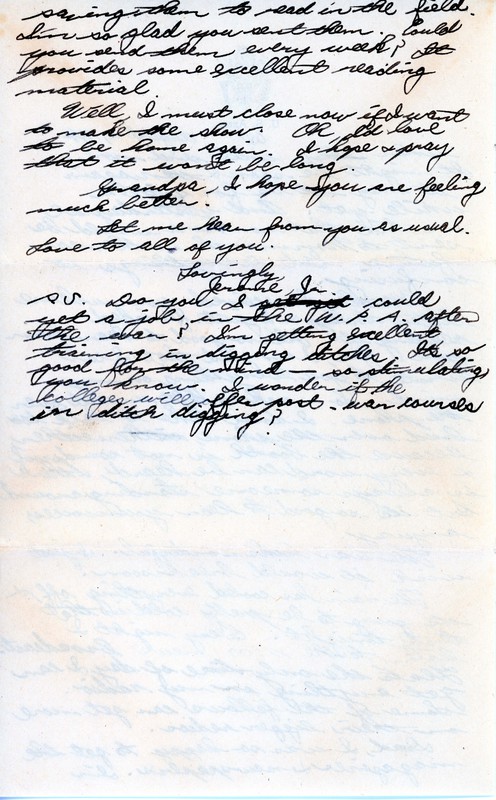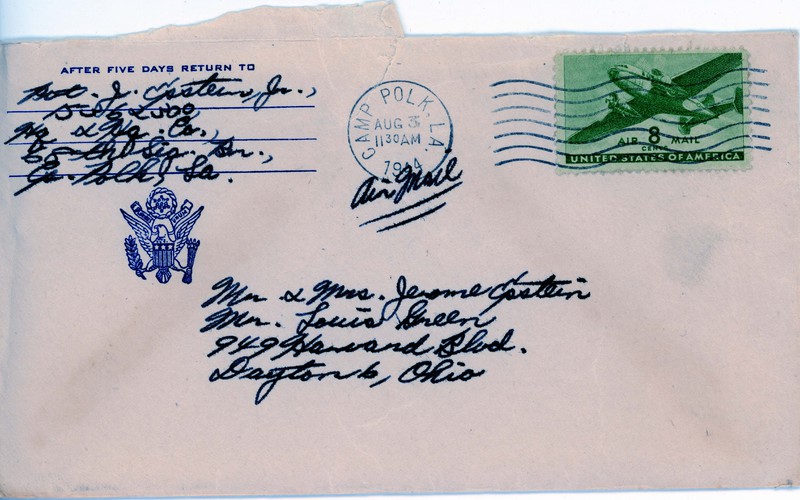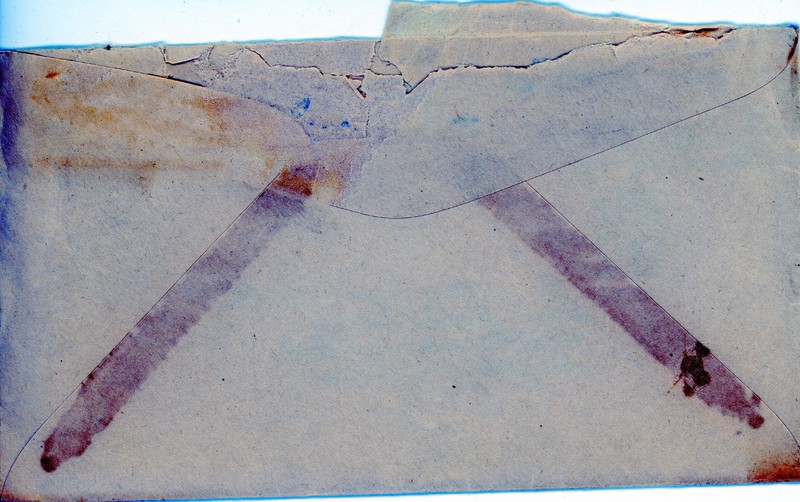August 2, 1944
Dear Mother, Dad, and Grandpa
I’m again writing in the library tonight. I just came home from the Service Club where I had a Boston cooler (coke and strawberry ice cream) and a piece of apple pie. I came over here to read the paper and write this letter. Just ran out of blue ink. Gee, is this black ugly. I’m going to the show in a little while. Frank Sinatra, George Murphy, and Gloria De Haven are playing in “Step Lively” so I thought I might as well see it and swoon a little over Frankie! I never did see anything so wonderful about him. Crosby is much better. I probably won’t be able to see any more movies for a long while.
We started out with a little code this week, but yesterday afternoon and all day today RI was out to our bivouac area digging garbage pits and a pit for a box in which to keep ice. I worked on the latter. There were 6 of us and we took turns 2 at a time every ten minutes, swinging a pick and shoveling. It has to be 8 ft. deep and 6 ft. in length and width. So far we are down about 3 ft. so I suppose we will be digging for at
least a couple of more days yet. The clay around here is like concrete, it is so hard. We ate in the field this noon. Once of the sergeants brought 8 watermelons, and he divided them up between us. They weren’t cold, of course, but they were very good. You see a lot of watermelons here. They have them a lot in the Service Club. Then our lunch was brought to us—a piece of apple pie, 2 bacon, lettuce, and tomato sandwiches, iced tea (no sugar), and an orange. It wasn’t too much, but it tasted darn good. Funny thing, when you’re in the field you eat with your hands no matter how dirty they are, and you don’t mind it because you are so hungry.
This afternoon it rained very hard so we quit work and came back to camp. Some of the tents were soaked through and through, but somehow mine didn’t get very wet. Thank goodness my blankets didn’t get wet. It’s awful to have to sleep on wet blankets.
We move out Friday. We will eat in the field, but they will bring us in every day for our training. At least that is the way things stood when I last heard. They can change it 10 times yet and probably will. That’s the Army.
I just heard from Jim Friedberg and another fellow that they are getting more quotas for school, and that most likely they will be for Monmouth. So I may get there yet. I don’t know
when they will send more. It might be soon but then again it may not be for quite a while yet. And yesterday we we [sic] told that no more would be sent to Monmouth in the near future. God, everything is so confusing.
Mother, I received your welcome letter today, and I just finished reading it. It’s so good to hear from you. Yes, I am glad that I can write to you everything on my mind. So much is left unsaid over the phone. I don’t like to talk too loud over the phone either either because the booth is not soundproof and every word can be heard and there is always someone standing around. But it’s so good to hear your voices, anyway.
The war looks wonderful. I just wish it would break soon.
The rain has cooled everything off and it’s going to be pretty cold in that tent tonight. Every night I listen to the 11:00 news broadcast. That’s the only time of day I can get anything on my radio. Some of the fellows can get more on their bigger radios.
Dad, I was so happy to get the magazines and newspapers. I’m
saving them to read in the field. I’m so glad you sent them. Could you send them every week? It provides some excellent reading material.
Well I must close now if I want to make the show. Oh, I’d love to be home again. I hope and pray that it won’t be long.
Grandpa, I hope you are feeling much better.
Let me hear from you as usual. Love to all of you.
Jerome, Jr.
P.S. Do you I get get could get a job in the W.P.A.[1] after the war? I’m getting excellent training in digging ditches. It’s so good for the mind – so stimulating you know. I wonder if the colleges will offer post-war courses in ditch digging?
[1] Works Progress Administration. A New Deal program designed to provide jobs, mostly unskilled labor, to the unemployed on public works projects.

